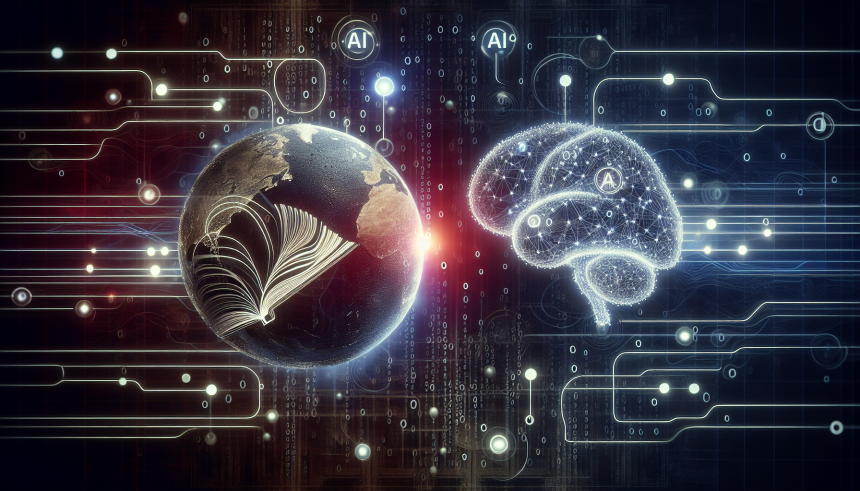The Interplay of Knowledge and AI: A Comprehensive Guide
Understanding the Concept of Knowledge
Knowledge can be viewed as the accumulation of information, experiences, and insights acquired through learning. It exists in various forms, spanning explicit knowledge—such as facts and data documented in books and databases—and tacit knowledge, which includes personal insights and intuitions that are often difficult to articulate. The interplay of knowledge and artificial intelligence (AI) brings forth content creation, decision-making processes, and problem-solving capabilities in unprecedented ways.
AI Frameworks Leveraging Knowledge
AI systems employ diverse frameworks to leverage knowledge. Key approaches include:
-
Knowledge Representation: This involves encoding information and relationships within complex databases or ontologies. These frameworks allow AI to utilize structured and unstructured data efficiently. Examples include semantic networks and knowledge graphs that help AI systems understand contextual relationships and draw inferences.
-
Natural Language Processing (NLP): NLP enables AI to interact with human language. Knowledge integration in NLP entails processing syntax, semantics, and context, thereby facilitating comprehension and response generation, transforming the way humans access and use knowledge.
-
Machine Learning (ML): This involves algorithms trained on vast datasets to identify patterns and make predictions. The effectiveness of ML models often depends on the quality of the knowledge inputs—training datasets that include rich, diverse information yield more robust models.
The Role of Data in Shaping AI Knowledge
Data serves as the foundation upon which AI systems are built. The quality, diversity, and volume of data significantly influence how knowledge is applied in AI systems. Structured data, such as databases, offers clarity and is easy to input into AI models. Unstructured data, such as articles, images, and videos, requires sophisticated techniques for extraction and interpretation. Thus, the interplay of organized and disorganized data is crucial for developing intelligent systems capable of mimicking human-like reasoning.
Knowledge Acquisition in AI
The acquisition of knowledge in AI primarily occurs through two avenues: supervised learning and unsupervised learning.
-
Supervised Learning: Here, models are trained on labeled datasets where inputs are paired with their respective outputs. The knowledge gained is dependent on the quality of the labeled data provided. This method is prevalent in applications such as image recognition and speech-to-text conversion.
-
Unsupervised Learning: In this approach, AI systems discern patterns in data without supervised input. Clustering algorithms identify natural groupings in the data, while association algorithms determine patterns and relationships. These methods are particularly useful for knowledge discovery in vast datasets where relationships may not be immediately apparent.
Human-AI Interaction: Enhancing Knowledge Exchange
The collaboration between humans and AI is vital in fostering a culture of knowledge exchange and advancement.
-
Augmented Intelligence: This paradigm emphasizes the synergy between human intellect and AI capabilities, optimizing outcomes in areas such as healthcare, finance, and education. For instance, while AI can analyze patient data to suggest diagnoses, human experts apply ethical considerations and emotional intelligence in treatment plans.
-
Interactive Learning: AI systems utilize human feedback to fine-tune knowledge and improve learning algorithms. Platforms like chatbots and recommendation systems benefit from user interactions, which help them refine outputs and suggestions iteratively.
-
Knowledge Creation: AI can assist in the research and development process, rapidly analyzing vast amounts of literature and data to identify trends and generate hypotheses. This capability allows researchers to channel their energy into creative problem-solving rather than exhaustive data processing.
Ethical Considerations in AI Knowledge Management
As AI integrates deeper into knowledge-based tasks, ethical considerations rise to prominence. Issues regarding data integrity, bias, and the transparency of decision-making processes necessitate scrutiny.
-
Bias in AI: AI models can perpetuate or amplify existing biases found in training data. Organizations must actively address data representativeness to create fair AI systems capable of equitable outcomes. Regular audits of AI systems help ensure that biases do not lead to unjust practices.
-
Transparency: The “black box” nature of many AI systems makes understanding decision-making processes challenging. Ensuring AI operates transparently fosters trust and allows stakeholders to grasp how knowledge is being processed and applied.
-
Intellectual Property Rights: As AI creates new content and solutions based on accumulated knowledge, issues arise regarding ownership and attribution. It is essential for legal frameworks to evolve alongside AI advancements to protect creators and stakeholders.
The Future Landscape of AI and Knowledge
The fusion of knowledge and AI is set to redefine industries and society. Emerging trends to watch include:
-
Knowledge-Centric AI: This development prioritizes the integration of explicit knowledge frameworks within AI systems, enhancing reasoning capabilities. Systems like IBM’s Watson and Google’s Knowledge Graph exemplify this trend by processing vast amounts of organized knowledge for user queries.
-
Explainable AI (XAI): This emerging field aims to make AI’s decision-making processes more understandable. By providing clarity about how decisions are made, XAI bridges the gap between AI efficacy and human trust.
-
Global Knowledge Networks: The increasingly interconnected world population creates opportunities for AI systems to tap into global, diverse knowledge pools. Crowdsourcing knowledge from various cultures and disciplines promises innovative solutions to global challenges.
Conclusion: The Symbiosis of Knowledge and AI
In the interplay of knowledge and AI, we find a relationship rich with potential, fraught with challenges, and ripe for exploration. As advancements continue, understanding this dynamic can empower individuals and organizations to leverage technology for smarter, more informed decision-making, driving progress across all sectors of society.


